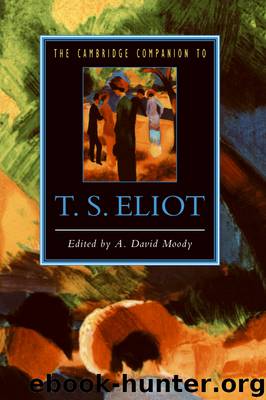The Cambridge Companion to T. S. Eliot by A. David Moody

Author:A. David Moody
Language: eng
Format: epub
Publisher: Cambridge University Press
10
JOHN KWAN-TERRY
Ash-Wednesday: a poetry of verification
While Eliot’s prose writings between 1925 and 1945 expound the need for self-transcendence, his poetry can be said to display the difficulties involved in this process. As early as 1916, in his dissertation on Knowledge and Experience in the Philosophy of F. H. Bradley, he had made it clear that by “self-transcendence” he meant, paradoxically, the struggle to progress from a purely personal experience of contact with the noumenal, the realm that is beyond phenomena and outside the process of time, by entering more fully into the shared world of objects and of time; and by multiplying experiences to pursue the ideal “of an all-inclusive experience outside of which nothing shall fall” (KE p. 31). The assumption is that the more comprehensive our experience, and the more unified our knowledge derived from experience, the nearer we come to the total truth.
It is the limited scope of merely private experience that compels us to go out of ourselves, out of even our most intense and timeless moments, into the common world of others and of passing events. No individual can be self-sufficient, “for the life of a soul does not consist in the contemplation of one consistent world but in the painful task of unifying (to a greater or lesser extent) jarring and incompatible ones” (KE p. 147). But to “unify” is to incorporate and to transmute, to make what was other our own, and so to get free again of the world of timebound phenomena. The vital difference between the beginning and the end of this process is that what was at first simply one’s private experience comes to be confirmed and verified, and established as impersonal and absolute truth. The kind of truth in question, however, as Eliot made clear, is metaphysical, and not the literal truth of science: “It involves an interpretation, a transmigration from one world to another, and such a pilgrimage involves an act of faith” (KE p. 163). The process of verification does not end then in objective certainty, but can only confirm the faith, the personal desire, which drives us on toward the whole truth which may, or may never, be attained.
Eliot’s “Ariel” poems are, in this sense, prayers of faith. In “A Song for Simeon,” Eliot has Simeon say: “Not for me the ultimate vision.” And it is interesting to note that Simeon does not connect with the congregation of believers: “Not for me the martyrdom, the ecstacy of thought and prayer.” He seems to return, at the conclusion of the poem, to the veracity of individual experience. Perhaps such a moment of experience is like belief in the Second Advent, the parousia that the early Christians waited for: a hope based on faith. Verification is thus still to come. It is a matter of faith that one’s experiences are “real,” not a matter of objective knowledge, and it is a matter of faith that there is a total identity or an Absolute, not a matter of scientific verification.
Download
This site does not store any files on its server. We only index and link to content provided by other sites. Please contact the content providers to delete copyright contents if any and email us, we'll remove relevant links or contents immediately.
| African | Asian |
| Australian & Oceanian | Canadian |
| Caribbean & Latin American | European |
| Jewish | Middle Eastern |
| Russian | United States |
4 3 2 1: A Novel by Paul Auster(12356)
The handmaid's tale by Margaret Atwood(7732)
Giovanni's Room by James Baldwin(7303)
Asking the Right Questions: A Guide to Critical Thinking by M. Neil Browne & Stuart M. Keeley(5742)
Big Magic: Creative Living Beyond Fear by Elizabeth Gilbert(5728)
Ego Is the Enemy by Ryan Holiday(5395)
The Body: A Guide for Occupants by Bill Bryson(5066)
On Writing A Memoir of the Craft by Stephen King(4921)
Ken Follett - World without end by Ken Follett(4707)
Adulting by Kelly Williams Brown(4554)
Bluets by Maggie Nelson(4535)
Eat That Frog! by Brian Tracy(4502)
Guilty Pleasures by Laurell K Hamilton(4428)
The Poetry of Pablo Neruda by Pablo Neruda(4081)
Alive: The Story of the Andes Survivors by Piers Paul Read(4011)
White Noise - A Novel by Don DeLillo(3992)
Fingerprints of the Gods by Graham Hancock(3980)
The Book of Joy by Dalai Lama(3962)
The Bookshop by Penelope Fitzgerald(3829)
